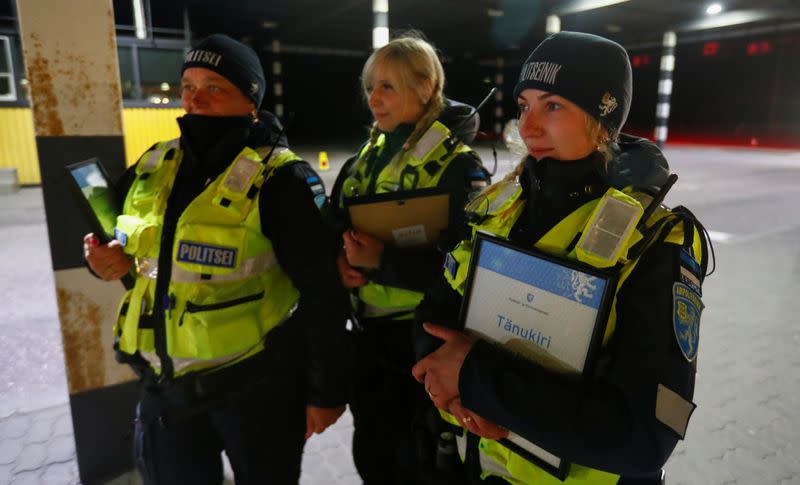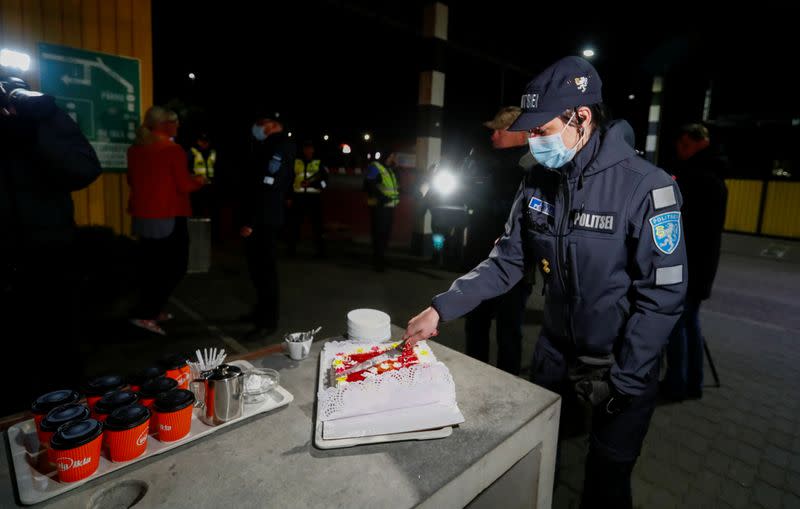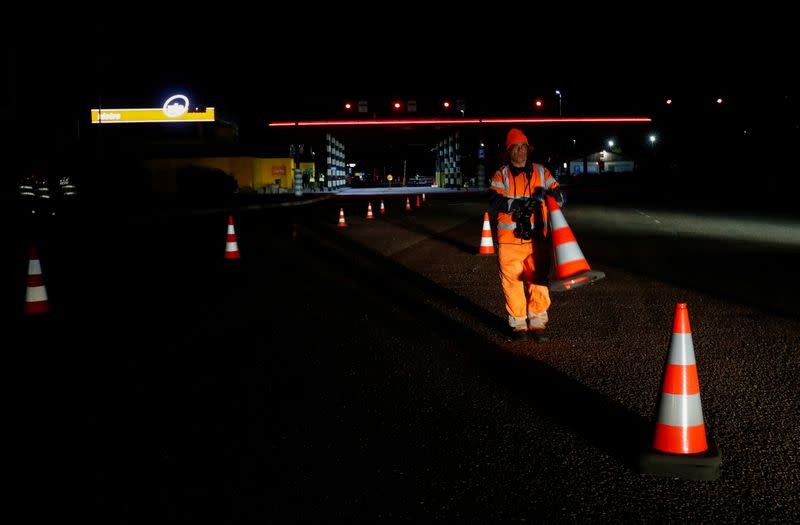Baltics open Europe's first pandemic 'travel bubble' as curbs ease
IKLA/AINAZI BORDER CROSSING POINT, Estonia/Latvia (Reuters) - Lithuania, Latvia and Estonia opened their common borders at the stroke of midnight, creating the first "travel bubble" within the European Union in a bid to jump-start economies broken down by the coronavirus pandemic.
A dozen Estonian border guards removed all signs directing vehicles to stop at the border and huddled together at the roadside for cake and coffee.
"We have the little celebration because the border is now open again," officer Martin Maestule told Reuters on Friday just after midnight as the first cars sped through on the region's reopened main road.
Citizens and residents of the three generally sparsely populated Baltic nations are now free to travel within the region, though anyone entering from outside must self-isolate for 14 days.
"The Baltic Travel Bubble is an opportunity for businesses to reopen, and a glimmer of hope for the people that life is getting back to normal," Lithuanian Prime Minister Saulius Skvernelis said in a statement.
The Baltics opened up as the EU executive seeks to coax the 27 member states to reopen internal borders and restart wider travel, albeit with safety measures such as requiring people to wear face masks on planes.
New coronavirus infections in the three Baltic republics have slowed to a trickle with none reporting more than a dozen new cases on Thursday. Authorities have loosened lockdowns since late April.
The region has recorded fewer than 150 deaths from the disease - far below larger euro zone countries such as Italy, Spain, France or Germany.
"The Baltic states are close partners, have a similar epidemiological situation and their economies are well integrated, so the free movement of people as well as goods is very important for the region," said Arnoldas Pranckevicius, the European Commission representative in Lithuania.
"Opening the borders is up to the member states, and the European Commission expects them to talk to each other, to coordinate their actions and to not discriminate against nationals of other EU members."
Some 120 vehicles crossed the border between Latvia and Lithuania in first five hours of Friday, officials said.
"We are driving to pick up our puppy - we will meet the new member of our family for a first time," Latvian Ervins Butkevics said as he crossed into Lithuania. "It's a date!"
Lithuanian and Estonian foreign ministers drove to Riga on Friday to sign a three-way memorandum on running the travel zone together.
No hands were shaken, the ministers sat almost 2 meters apart and signed three separate copies of the document, which foresees jointly opening the zone to countries where the virus has been dealt with.
Lithuania, Latvia and Estonia - the three poorest members of the euro zone - expect their economies to shrink by 7-8% this year, in line with the rest of the currency union. Lithuania has warned of a "double digit" drop if economies are not reopened by the summer.
Estonia has given an emergency loan of 100 million euros ($108 million) to Baltic Sea shipping firm Tallink, badly hit by the lockdowns, while Lithuania is setting up a state-run facility to support key companies if they do not survive the crisis.
The Baltic countries were quick to close their borders and impose lockdowns.
"There is no reason to fear that opening the border will cause the spread of the virus," Estonian Interior Minister Mart Helme said.
Travel restrictions were eased between Finland and Estonia, as well as between Poland and Lithuania, this week but only for those on the move for business or education.
But neither Poland nor Finland is rushing join the full "travel union" with their Baltic neighbours, despite an invitation to do so.
Poland and Finland have also reported relatively low numbers of coronavirus infections and deaths.
"We should look at not only the physically nearest countries, but also at distant countries with clearly low epidemiological situation - direct flights from them could be free of the quarantine", Estonian Foreign minister Urmas Reinsalu said.
(Reporting by Janis Laizans at the borders, Andrius Sytas in Vilnius, Tarmo Virki in Tallinn, Gederts Gelzis in Riga with additional reporting by Marcin Goclowski in Warsaw; Writing by Andrius Sytas; Editing by Niklas Pollard, Mark Heinrich, Nick Macfie and Giles Elgood)






